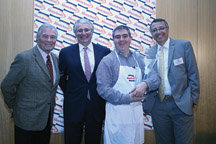With Passover beginning this Monday evening at sundown, Manischewitz products have pride of place in many area supermarkets.
As part of a modern makeover, the Secaucus-based company has introduced an astonishing 35 new products this year, the most it has ever introduced in one year.
And as part of a measure to keep the iconic kosher food company strong, co-CEOS Alain Bankier and Paul Bensabat have decided to consolidate the operation under one roof in Newark, where their manufacturing plant is.
“We love Secaucus,” Bankier said. “We’ll be sad to leave. It’s a great place with great restaurants, but we want the whole company under one roof.”
Bankier cites the very popular Mediterranean fish meatballs.
________
“New products and a new face,” summed up Bankier.
The new products, which are in stores now, include confectionary items such as chocolate covered cookies, desserts, and snacks. It’s even introduced a cupcake making kit.
“The focus is on the family and children,” Bankier said. “This is something the whole family can do together.”
Passover observes the exodus of Jews after they were freed from 400 years of Egyptian slavery. When the pharaoh freed them, it is said that they didn’t even have time to wait for their bread to rise. So at this time of year, observant Jews eat only bread that has no leavening agent that makes it rise, such as yeast. They also hold religious observances known as seders.
Not just kosher
During Passover, shelves will be stocked with traditional items, such as matzos, potato pancake mix, and matzo ball soup mixes. The Manischewitz company has a new, forward-looking feel.
“We want to enhance the culinary experience with a whole new strategy,” said Bankier. “The philosophy is, a great culinary experience, and it’s kosher. Basically great food that is kosher, not just kosher food.”
Food roots
Both Bankier and his co-CEO Paul Bensabat are Sephardic Jews with Mediterranean roots, as opposed to Ashkenazi Jews, who have Eastern European roots. The company’s new offerings reflect that heritage.
Bankier was born in Morocco to French parents and moved to Silver Spring, Md., as a child.
“Sephardic traditional food is fantastic,” Bankier said. “Most restaurants in Israel serve Mediterranean Sephardic-inspired food.”
Bankier cites the very popular Mediterranean fish meatballs. “It’s a Sephardic tradition having fish meat balls in a spicy sauce,” he said. The recipe came from Paul Bensabat’s mother in Morocco.
“We want to enhance the culinary experience with a whole new strategy.” – Alain Bankier
________
“We have a strong theme of health and wellness,” Bankier said. “Our new packaging has a little tag on the bottom of each product marked with L’Chaim.” [Hebrew for “To Life.”].
The labels indicate health benefits, such as zero trans fats, gluten-free, fat-free, or sodium-free.
The company’s Guiltless Gourmet brand is in a health and wellness category. “It’s a line of healthy snacks, such as baked rather than fried chips, and wraps, all natural and healthy,” Bankier said.
“The new packaging gives a unified look,” Bankier said. “The consistent look helps consumers indentify Manischewitz. It looks great. It’s modern, exemplary, not Manischewitz from the ’50s or ’60s. It’s very appealing, and consumers have reacted very well to it.”
No need to be Jewish
Non-Jews have long championed the purity of kosher food. “In today’s world everyone is concerned with safety and cleanliness,” Banker said. “With a rabbi basically watching the food, the extra set of eyes and level of supervision can only be helpful.”
How many non-Jews are buying kosher food?
“It’s hard to really identify that,” Bankier said. “Our feeling is that at least half our consumers are not Jewish. We sell canned fish and sardines all over the country in the non-kosher aisle, and people don’t have a clue it’s kosher. A lot of my non-Jewish friends call me up and say they love these products.”
Muslims are also fans of kosher food. “They can’t always find the halal foods they want,” Bankier said.
Manischewitz products are readily available in Hudson County supermarkets.
“Where the Jewish population is smaller or nonexistent, there will be a smaller selection, and where the Jewish population is larger, a larger selection,” Bankier said. “At this time of year the Tri-State area and most urban centers have a very good selection of products.”
Company roots
Bankier was an investment banker for 20 years before joining with Bensabat to form Saveur Foods. They bought three food companies, merging with Manischewitz.
“As an investment banker, I specialized in industries that worked with food,” Bankier said, “and Paul had a lot of food experience.”
Bankier swears by technology. “I’m a big advocate of technology and using it to develop a traditional business,” he said.
They’re on Twitter and Facbook and have “a dazzling new website.”
But, with all the new products and new media, Bankier said that the company is really going back to its roots.
“Manischewitz was founded by a rabbi in 1888, an entrepreneurial, innovative manager,” he said. “Jewish tradition, culture, and history are in the DNA of all people at Manischewitz. And food is a passion. We are doing something that touches people intimately and directly. It’s a big responsibility.”
Kate Rounds can be reached at krounds@hudsonreporter.com..
